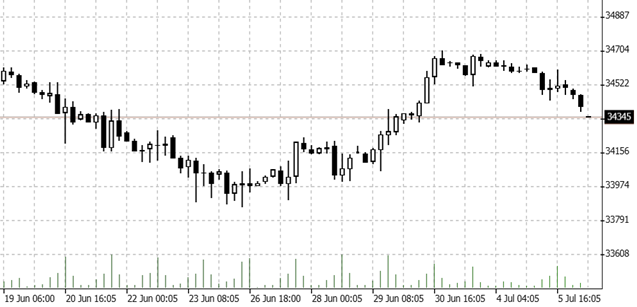

06.07.2023 – Finally news: In a quiet week, the Fed Minutes have provided a little movement. And namely to the south. But the matter was not really surprising: Presumably there will be further interest rate hikes.
So after the national holiday on the 4th of July yesterday, the minutes of the June meeting. The market was somewhat irritated after the Fed Minutes. Here is the four-hour chart of the Dow Jones.

Source: Bernstein Bank GmbH
And these are the details. Almost all members on the Federal Open Market Committee were in favor of more rate hikes. But at a slower pace than before.
Fear of recession
The reason for the June pause after rate hikes: The FOMC worried about economic growth. Specifically, it said, “The economy was facing headwinds from tighter credit conditions, including higher interest rates, for households and businesses, which would likely weigh on economic activity, hiring, and inflation, although the extent of these effects remained uncertain.” So the Fed is well aware that it could choke off economic growth.
The factory orders that just came in confirmed this concern. Core orders in May slipped for the fourth straight month, marking the weakest reading since September 2020 at minus 4.24 percent year-over-year.
In addition, some monetary watchdogs wanted more time to assess the steps taken so far. Literally, the minutes said, “leaving the target range unchanged at this meeting would allow them more time to assess the economy’s progress toward the Committee’s goals of maximum employment and price stability.” After all, the 5 percentage point increase was the most aggressive tightening since the early 1980s.
There’s probably more to come
So what’s next for the Fed? Presumably, there will be more rate hikes. At the June 13-14 meeting, 16 of 18 members thought at least one more rate step would be needed. Twelve even wanted two or more.
The upshot of all this is that the hawks on the FOMC actually wanted to raise again in June, but they agreed to a pause. On the condition that there will be more rate hikes at the end of the year. So if incoming data do not bring any surprises, another hike in July is a foregone conclusion. All in all: higher for longer. And this despite the fact that the Fed is well aware of the risks of an economic downturn. For corporations, this means: Higher borrowing costs with declining consumption. A rather unpleasant situation. We are curious to see what happens next – whether long or short: Bernstein Bank wishes successful trades and investments!
______________________________________________________________________________________________________
The content of this publication is for general information purposes only. In this context, it is neither an individual investment recommendation or advice nor an offer to purchase or sell securities or other financial products. The content in question and all the information contained therein do not in any way replace individual investor- or investment-oriented advice. No reliable forecast or indication for the future is possible with respect to any presentation or information on the present or past performance of the relevant underlying assets. All information and data presented in this publication are based on reliable sources. However, Bernstein Bank does not guarantee that the information and data contained in this publication is up-to-date, correct and complete. Securities traded on the financial markets are subject to price fluctuations. A contract for difference (CFD) is also a financial instrument with leverage effect. Against this backdrop, CFD trading involves a high risk up to the point of total loss and may not be suitable for all investors. Therefore, make sure that you have fully understood all the correlating risks. If necessary, ask for independent advice. CFDs are complex instruments and are associated with the high risk of losing money quickly because of the leverage effect. 68% of retail investor accounts lose money trading CFD with this provider. You should consider whether you understand how CFD work and whether you can afford to take the high risk of losing your money.7
